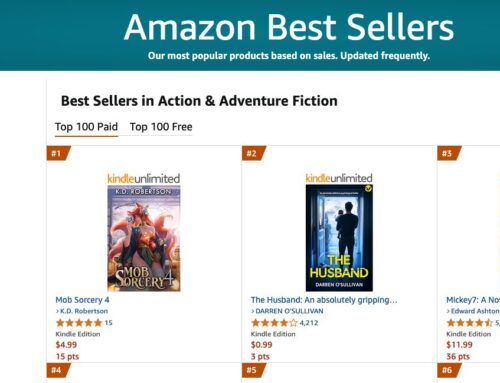 It’s odd that the recent firestorm about paid reviews and unscrupulous self-publishers has actually rekindled my love of self-publishing. Ever since Amanda Hocking, the vibe around self-publishing has been money, money, money. On the one hand, I was grateful for this because it put self-publishing on the map: money talks. On the other hand: this is the worst determination of value and pretty much what’s wrong with the world, and publishing in general. The reason that I fled traditional publishing (after having a series of agents and traditional contracts) was because of the overemphasis on marketing and past sales. Publishing was all about a numbers game.
It’s odd that the recent firestorm about paid reviews and unscrupulous self-publishers has actually rekindled my love of self-publishing. Ever since Amanda Hocking, the vibe around self-publishing has been money, money, money. On the one hand, I was grateful for this because it put self-publishing on the map: money talks. On the other hand: this is the worst determination of value and pretty much what’s wrong with the world, and publishing in general. The reason that I fled traditional publishing (after having a series of agents and traditional contracts) was because of the overemphasis on marketing and past sales. Publishing was all about a numbers game.
My support for self-publishing has been about self-expression – every writer should have a chance to express themselves in print or ebook, no matter how flawed those books may sometimes be. The slippery slope of the traditional publishing industry suggests that many, many interesting and/or adventurous books are not getting published. That’s a loss to the culture at large. This is self-publishing’s value – intellectual freedom, not the freedom to be independently wealthy. Of course, it’d be great to have the latter, but the former is more important.
And so it’s somewhat vindicating to see the greed impulse in self-publishing sort of fall apart. It’s also eye-opening about all the successes that have happened. Frankly, it’s always been kind of mysterious why one book totally takes off and another one does not. This has been chalked up to the ephemeral “word of mouth,” but in some cases that word of mouth was fake. On many books with 100+ reviews, you’ll inevitably see, “This book is terrible. All those 5-star reviews must be family…” I always chalked it up to bitter reviewers, but it turns out some of them were right. I’d look at a book with a terrible cover, terrible synopsis and think, This is what people want to read? It was pretty depressing. It turns out readers really didn’t want to read those books.
I’ve had my differences with JA Konrath for a long time. In the past, he crapped all over self-publishers because they didn’t have the approval of a publishing “professional.” Then he became a self-publishing convert, because evidently $ speaks louder than a publisher’s approval. It irked me that he would continually trump up his income. This can be useful to see how self-publishing is progressing and “legacy” publishing is archaic, but his impulse was to highlight all the money-makers to prove his point, rather than people who are writing good books, but might not be selling a lot. Those people don’t fit into JA Konrath’s narrative, even though they’re the writers who might need the attention more.
I’ll admit some of this is jealousy – I mean, who isn’t jealous of someone who’s making a lot of money off of writing? It’s every writer’s dream, no matter how much they prize art over commerce. But still, it created an environment of money obsession, so it was no wonder that a lot of writers took this to heart and decided to become successful by any means necessary. And it turns out many of those successful writers were built on sand.
Konrath reveals his bias by defending authors leaving 5 or 1-star reviews. He began his post with this, but deleted it: Buying reviews isn’t wrong. Using sock puppets isn’t wrong. Leaving fake one star reviews isn’t wrong. The basic gist of the post is:
You either believe in freedom of speech, and allow people to say things within a system where freedom is allowed, or you try to police the system, which is impossible and also very wrong.
This argument makes little sense. The ACLU defends the KKK’s right to say what it likes – while the First Amendment also protects everyone else from condemning the KKK. Writing fake reviews is wrong – nobody is saying that there should no longer be 1-star reviews, but that authors should stop lying. He’s trying to defend the indefensible. He continues,
Show me one star reviews harm authors. Hint: Amazon allows one star reviews.
Of course 1-star reviews harm authors. How can they not? His point seems to be that because there are 1-star reviews and people still buy books, then 1-star reviews never hurt a book’s sales. This doesn’t really even need refuting.
The weirdness of this argument is some vindication that the anything-goes mentality was wrong from the outset. Self-publishing is really just beginning, and it’s in flux, so these issues will eventually be worked out. But it’s a problem when self-publishing’s biggest advocate says things like (paraphrasing) “Fake reviews are OK and everyone else should feel worse for criticizing it.” The subtext is: all’s fair if you can get ahead.
I don’t want to make this all about Konrath – because he’s also been a good advocate for self-publishing and helped put it on the map – and I don’t begrudge anyone who wants to make money on their writing (I do). I just never liked that this became the main argument for self-publishing. In the long run, these recent stories might be good for publishing, even if it’s shown that some reviews are fraudulent. It could potentially be a disaster because people will stop taking all reviews seriously, or start distrusting self-published books. But that’s probably not going to happen – self-publishing is too integral to the overall publishing climate, and readers will learn to be more discerning. What will happen is that writers will not be able to game the system so easily. Which is good news, really: this unscrupulous practice was eventually outed. The system works.
Get an Editorial Review | Get Amazon Sales & Reviews | Get Edited | Get Beta Readers | Enter the SPR Book Awards | Other Marketing Services






















Well said. The outrage over the outrage did seem a bit self-serving. After all, when journalists get caught plagiarizing, they face consequences. Unethical behavior, when outed, has repercussions. These cases are no different. Fortunately, the controversy left the confines of self-publishing alone once it became known that traditionally published authors have been doing the same thing! It’s becoming an even broader concern; for example, the outraged Republicans who “yelped” a pizza shop owner who had the affrontery to “pal around” with the president last week. I personally hope the five-star rating systems go out of vogue. I’d rather see the YouTube style thumbs-up/thumbs-down take over. At least it takes the extremes out of the recommendation engines.
Re: Yelp. They’re protesting Obama’s record on small business…by attacking a small business. Anyway (promised I wouldn’t get political).
To get to Konrath’s point – these reviews are allowed, so stuff like this is going to happen. It’s like self-publishing itself: bad stuff is going to get published when it’s a free for all. True, but their right to do that doesn’t trump everyone else’s right to say they shouldn’t.
Fake reviews abound and are here to stay, be it cars, movies, restaurants or books. I think the average consumer has always been aware of this fact. I do read reviews on Amazon, but have never trusted them. What gets me to buy an ebook is the description and the “look inside” feature. I can usually tell by the third page or so whether this is a book worth buying. That said, as a first time self published author, I adore getting reviews, and read them again and again (I’ve been lucky to get good ones so far.) What I’m saying is maybe book reviews hold a lot more importance to the author rather than the consumer, and that’s why so many are “spiking the punch.” Oh, and Henry, I agree with you that too many of us are caught in the sales numbers game. My book may never be a profitable smash hit, but I’m glad I wrote it just the same.
I think self-publishing has changed, but only because it has now become a viable option (or rather, digital publishing) for a few to make a living. Publishing was always a way for a few to make a viable living. Why authors think differently now of self-publishing, I’ve no idea – well, maybe I do, read on! Now we have the 10 point marketing plans and how to make a million on kindle taking hold of self-publishing. What’s changed is that the marketers have arrived and set up camp. Self-publishing has become the new commodity for the get-rich-quick brigade. This is not about getting rich from self-publishing, but about getting rich on the back of the self-publishing community. It’s sad, not because some authors are fooled by the golden cow, or mainstream publishers now see self-publishing as the answer to their failings as gatekeepers and curators (I call it the self-publishing honeypot), but that we are quickly losing sight of what it is to be a good writer.
I’ll leave Konrath to his own universe. He has enough commenters and followers foolishly bowing down at the altar no matter what he says. I’ve mixed feelings about his posts – last week I felt he made valid points about not casting the first stone until you examine what goes one in your own house, and this week – as usual – he couldn’t leave it there and diluted what he said last week. It’s like leaving a feeding trough out for the cows in the morning to feed on. I gave up on Nathan Brandsford for similar reasons – too much to say and too often said. It became about feeding daily titbits to the hordes of adoring followers, and anything of value got lost in the melee to feed and comment.
I’ve grown tired of the sock-puppet discussing – not because it doesn’t go to the heart of what a valued review should be – but because it’s a wholesale problem within publishing itself. It’s being going on for years through affiliation programs, advertising, in-house author reviews and blurbs, sponsored TV/Radio slots etc. What concerns me most is that self-publishing is too quick to take on and embelish the worst of mainstream publishing business.
Every second post and news piece within the self-publishing community is about the ten steps to self-publishing heaven or how to be a Kindle millionaire. That’s partly because the business marketers have finally arrived – happy to see everyone in the self-publishing community talk about self-publishing, buy the book about how to succeed at it, or buy other self-published authors’ books, rather than actually write the next book.
You won’t see Konrath talk too often about the craft of writing or perfecting your writing skills – no – it’s all about how you too can be as successful as me – diatribe. The reality is that it is a million miles away from where most real self-published authors are situated, what they should be reading and listening to, and where they are going to be.
I was thinking – what’s a publicist except someone you hire to lie about your book? What’s every commercial on TV? Talking about the new “delicious” flavor of Ex-lax. Dishonesty is really a systemic problem. But writing should be held up to a different standard than commercials, even if it’s commercial fiction. This is similar to Milli Vanilli, or Stephan Glass, or, recently, Jonah Lehrer, as Tom mentioned. It’s a different level of dishonesty, so it doesn’t need to be defended.
Sort of related, recently Amanda Palmer got called out for not paying her band members, even if recently she made a million+ on Kickstarter. It’s like these indie cults of personality have come crashing back to Earth.
I suppose it’s like heroes and villains. The most reviled criminal deserves a defense lawyer to champion his/her cause. I think it is one thing we sometimes devalue in mainstream publishing – that there are genuine great editors and agents who will champion an author to the end.
Dishonesty maybe systemic, but we’ve all become accustomed to grading it. A lie is just an untruth – as if it were a quick sidestep away from the truth. Deliberately posting a bad review is viewed by some simply as ‘playing the game’, and it might lead to a sale or non-sale for one or other author. That’s the harm done – that one wrong doesn’t make a right.
I think we are in danger of taking writing to too lofty a perch. 95% of the words written tomorrow by writers will go toward adverts, non-fiction books, press releases, reviews, news items, manuals, political speaches etc – it’s likely they will all contain a modicum of dishonesty – no matter how heartfelt. It’s the remaining 5% of utter fiction we really need to heed!
Henry, I’m very glad to know you like self-publishing again. I agree with the comments above. I pay no attention to the endless bragging of those few writers who hit the jackpot (or claim to). I’ll never write anything for the millions who are willing to shell out money for “Fifty Shades.” Nor will I care what they spend their money on. I’m much more interested in writing fiction that will pass the test of time. Maybe it won’t; maybe, on the other hand, it will.
Thanks, Ron. I’ll admit I’ve let other people’s success get really under my skin because I’ve been working at this for a very long time. But that’s their path, not mine – it has nothing to do with anything I’ve written.
Everyone is focusing on the ethics/free speech aspect of this story, and ignoring the fact that reviews are used to game book placement within Amazon. It’s like in the old days of the web, when putting the word “viagra” a million times in the keywords of a page would instantly give you top search ranking. Google wised up to this, and changed the way things are ranked, and continue to do so. Amazon has not, but at some point will. When that happens, the house of cards will fall.
Agree 100% with Henry’s points on money versus art. We’re at the point where iPhone apps were a couple of years back, when every cab driver and housewife thought they could learn a little programming and become an app store millionaire. This will pass.
-Jon “The Other” Konrath
Yep, this is really black hat vs. white hat SEO. Amazon better come up with something to combat this or their recommendation engine is going to become more and more meaningless.
I agree completely that self publishing has opened up a world of free expression for writers. It’s an amazing development, one we don’t pay enough heed to, I think. I’ve been kinda turned off by the constant marketing, constant self promotion for a while now. This recent mess just convinced me how little interest I have in pursuing that type of marketing. I’m not really offended by the review buying and sockpuppeting because publishers have done far worse, often cloaked in a mask of legitimacy. And I’m not convinced any of this was particularly effective, anyway. It relies on underestimating the intelligence of readers.
I’ve also been a bit bothered by the people championing the anti-sockpuppets line, mostly because I think they’ve displayed the same trait in response, underestimating readers. Many of the arguments from them have included the “poor readers, manipulated into buying these books” line and treat them like a delicate porcelain figurine that needs to be protected.
Readers are far more savvy than that. Besides, this whole issue really only arose on the writer side. I’m not sure the average reader even cares. We’ve been bombarded with marketing messages from birth, some honest, some not. I’d like to think people can tell the difference. Nearly every time I read the comments on a news article online, I run across the “my aunt made $3000 last month working from home” spam messages. I’ve yet to be convinced working from home is right for me. At this point, I gloss right over the fake stuff with barely an acknowledgment because its remarkably easy to see the genuine comments and skip over the trolls and the spam and the marketing. I suspect your average online ebook buyer is behaving accordingly with reviews. I don’t like the implication that readers are naive, malleable and easily manipulated. I’ve always believed you underestimate your audience at your own peril, and the anti-sockpuppet folks came off to me as very patriarchal to readers, and that is one long-time trait of traditional publishing I have no patience for.
Well, it turns out readers weren’t all that discerning, b/c they were suckered into buying a million John Locke books from fake reviews. So it’s true you shouldn’t underestimate readers, but people do have a tendency to be easily manipulated as well.
I can’t help but agree with you both, Dan and Henry. I suspect Dan’s readership might be the same as yours and mine, Henry: readers who are willing to think. Fake reviews may have more of an impact on readers wishing something else.
Great post! Unfortunately, I don’t think fake reviews are going anywhere. As long as there are people looking to make a buck, there are going to be fakers. It’s too bad, really. But it’s no different than someone recommending their brother’s painting company even though they’ve never used it themselves. It’s not a new phenomenon and I do bleieve it’s here to stay.
While there’s money to be made, people will cheat. Like it or not, marketing is vital to publishing success. Some of the best books ever written will never be read. Some of the worst books will make millions. Has it ever been any different? Someone once said, “you don’t have to like the rules, just understand them.” Time to move on I think.